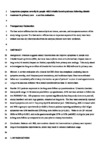Long‐term symptom severity in people with irritable bowel syndrome following dietetic treatment in primary care: A service evaluation
| dc.contributor.author | Seamark, L | |
| dc.contributor.author | Barclay, Y | |
| dc.contributor.author | Marchant, C | |
| dc.contributor.author | Williams, M | |
| dc.contributor.author | Hickson, Mary | |
| dc.date.accessioned | 2021-04-01T15:28:43Z | |
| dc.date.issued | 2021-03-24 | |
| dc.identifier.issn | 0952-3871 | |
| dc.identifier.issn | 1365-277X | |
| dc.identifier.other | jhn.12860 | |
| dc.identifier.uri | http://hdl.handle.net/10026.1/17019 | |
| dc.description.abstract |
<jats:title>Abstract</jats:title><jats:sec><jats:title>Background</jats:title><jats:p>Evidence suggests that dietary interventions can improve symptoms in people with irritable bowel syndrome (IBS), although most data explore the short‐term (immediate) impact. Data on long‐term (>6 months) impact are limited, especially from primary care settings. The present study aimed to investigate the long‐term effect of dietetic‐led interventions for IBS delivered in primary care.</jats:p></jats:sec><jats:sec><jats:title>Methods</jats:title><jats:p>A service evaluation of a dietetic‐led IBS clinic was completed, analysing data on symptom severity, stool frequency and consistency, and healthcare input. Data were collected before and immediately after dietary intervention as part of patients’ routine clinical appointments. Long‐term data were collected via a postal questionnaire at least 11 months later.</jats:p></jats:sec><jats:sec><jats:title>Results</jats:title><jats:p>In total, 211 patients responded to the long‐term follow‐up questionnaire at a median of 13 months (interquartile range 12–16 months) post follow‐up appointment. Of these, 84% had been advised to follow a low FODMAP (i.e., fermentable oligosaccharides, disaccharides, monosaccharides and polyols carbohydrates) diet. All symptoms were reported significantly less frequently short term, and all except heartburn and acid regurgitation remained so over the long term. The four most commonly reported bowel symptoms reduced in frequency were abdominal pain (62%), bloating (50%), increased wind (48%) and urgency to open bowels (49%) (<jats:italic>p</jats:italic> < 0.001). The percentage of patients reporting satisfactory relief of gut symptoms was 10% at baseline and 55% at long‐term follow‐up (<jats:italic>p </jats:italic>< 0.001). Visits to a general practitioner were reduced (from 96% to 34%; <jats:italic>p</jats:italic> < 0.001), as were those to the gastroenterologist (from 37% to 12%; <jats:italic>p</jats:italic> = 0.002), during the year prior to long‐term follow‐up compared to the year prior to dietary intervention.</jats:p></jats:sec><jats:sec><jats:title>Conclusions</jats:title><jats:p>Patients with IBS who received dietetic‐led interventions in primary care reported long‐term symptoms improvements that may result in reduced healthcare usage.</jats:p></jats:sec> | |
| dc.format.extent | 890-900 | |
| dc.format.medium | Print-Electronic | |
| dc.language | en | |
| dc.language.iso | en | |
| dc.publisher | Wiley | |
| dc.subject | diet | |
| dc.subject | dietitian | |
| dc.subject | irritable bowel syndrome | |
| dc.subject | long‐ | |
| dc.subject | term effects | |
| dc.subject | primary care | |
| dc.title | Long‐term symptom severity in people with irritable bowel syndrome following dietetic treatment in primary care: A service evaluation | |
| dc.type | journal-article | |
| dc.type | Journal Article | |
| dc.type | Research Support, Non-U.S. Gov't | |
| plymouth.author-url | https://www.webofscience.com/api/gateway?GWVersion=2&SrcApp=PARTNER_APP&SrcAuth=LinksAMR&KeyUT=WOS:000632129800001&DestLinkType=FullRecord&DestApp=ALL_WOS&UsrCustomerID=11bb513d99f797142bcfeffcc58ea008 | |
| plymouth.issue | 5 | |
| plymouth.volume | 34 | |
| plymouth.publication-status | Published | |
| plymouth.journal | Journal of Human Nutrition and Dietetics | |
| dc.identifier.doi | 10.1111/jhn.12860 | |
| plymouth.organisational-group | /Plymouth | |
| plymouth.organisational-group | /Plymouth/Faculty of Health | |
| plymouth.organisational-group | /Plymouth/Faculty of Health/School of Health Professions | |
| plymouth.organisational-group | /Plymouth/REF 2021 Researchers by UoA | |
| plymouth.organisational-group | /Plymouth/REF 2021 Researchers by UoA/UoA03 Allied Health Professions, Dentistry, Nursing and Pharmacy | |
| plymouth.organisational-group | /Plymouth/Research Groups | |
| plymouth.organisational-group | /Plymouth/Research Groups/Institute of Health and Community | |
| plymouth.organisational-group | /Plymouth/Research Groups/Plymouth Institute of Health and Care Research (PIHR) | |
| plymouth.organisational-group | /Plymouth/Users by role | |
| plymouth.organisational-group | /Plymouth/Users by role/Academics | |
| dc.publisher.place | England | |
| dcterms.dateAccepted | 2020-12-18 | |
| dc.rights.embargodate | 2021-4-7 | |
| dc.identifier.eissn | 1365-277X | |
| dc.rights.embargoperiod | Not known | |
| rioxxterms.versionofrecord | 10.1111/jhn.12860 | |
| rioxxterms.licenseref.uri | http://www.rioxx.net/licenses/all-rights-reserved | |
| rioxxterms.licenseref.startdate | 2021-03-24 | |
| rioxxterms.type | Journal Article/Review |


